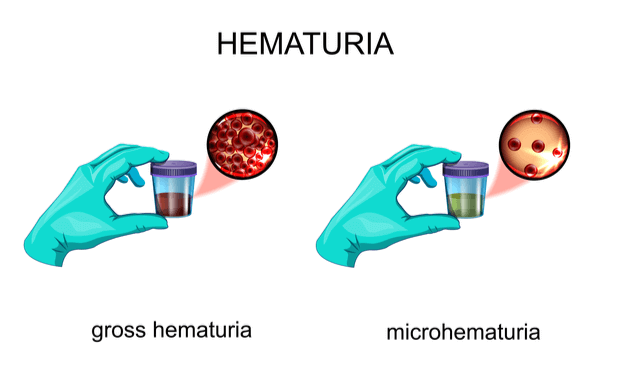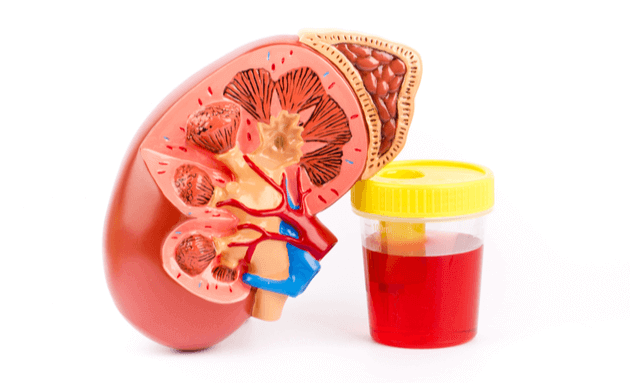Hematuria: Types and Causes Of Urine With Blood
Hematuria or blood in your urine is caused when the kidneys, or other parts of the urinary system, allow blood cells to leak into the urine. This can appear for multiple reasons. While it may not necessarily be a cause of great concern, it is wise to speak to your doctor about it because it could be a symptom of an underlying health condition.
Remember one thing - the blood in the urine is a symptom of something, not a condition by itself.
Types of Hematuria

Blood in your urine or hematuria isn’t always visible to the naked eye. In certain cases, a microscopic test is required to identify hematuria. Blood that can be seen with the naked eye may be referred to as 'Gross hematuria' and the one where the blood cells are visible only under a microscope is called 'Microscopic hematuria'
What causes Hematuria?
Quite often blood in your urine can actually come from a bowel movement, from the vagina (in women) or from semen (in men). It is important to verify that the blood in your urine is, in fact, coming from within the urinary tract before you can proceed.
Here are a few ailments that may cause blood to appear in your urine:
- Urinary tract infections or UTIs: UTIs occur when bacteria multiply in your bladder, kidneys, or urinary tract after entering through your urethra. Besides hematuria, a UTI can cause pain and burning while urinating, strong-smelling urine, and a persistent urge to urinate.
- Kidney infections: These infections are caused by bacteria that infect your kidney and may lead to symptoms like hematuria, a fever, flank (side) or abdominal pain, or frequent urination, amongst others.
- Bladder or kidney stone: Calcified crystals that form in the bladder or the kidney walls can gradually collect to form small stones. These stones are generally painless until they cause a blockage within the system or are being passed in your urine. They can cause excruciating pain during this time and lead to bleeding.
- Enlarged or infected prostate: The prostate gland is a walnut-sized gland that is located between a man’s bladder and penis. It is responsible for maintaining the health of sperm. With age, the prostate is known to enlarge, putting pressure on the urethra and sometimes blocking the flow of urine. This can lead to symptoms like hematuria or frequent urination. An infection of the prostate, known as prostatitis, can also have a similar effect.
- Kidney disease or injury: Your kidneys help filter your blood. When the kidneys get inflamed or small capillaries in the kidney get damaged, this filtration system can get affected leading to microscopic hematuria. Other ailments like diabetes, viral infections, blood vessel diseases, injury of the kidneys and immune problems that damage kidney capillaries can also hurt the kidneys and cause hematuria.
- Cancer or Inherited Disorders: Urinary bladder cancer or prostate cancer can cause gross hematuria due to damage to organ tissue. In these cases, hematuria will often appear only after cancer has significantly advanced. Further, hereditary disorders such as Sickle cell anaemia (an ailment that affects haemoglobin) and Alport syndrome (an ailment that damages the filtering membranes of the kidney) can also cause hematuria.
- Medication: Certain anti-cancer drugs, anticoagulants (medication to prevent blood clots), and blood thinners can cause blood to appear in your urine.
- Strenuous exercise: Although rare, extremely strenuous exercise can damage the bladder, cause dehydration, and lead to the breakdown of red blood cells. All of this can lead to gross hematuria and is common in runners.

In certain cases, the exact cause of hematuria may not be identifiable. While blood in your urine can be caused by several factors, it is best to not assume the reason. Instead, consult your doctor to explore further.
Based on the analysis, your doctor will recommend the course of treatment and might ask you to come back for a follow-up test, if required.






